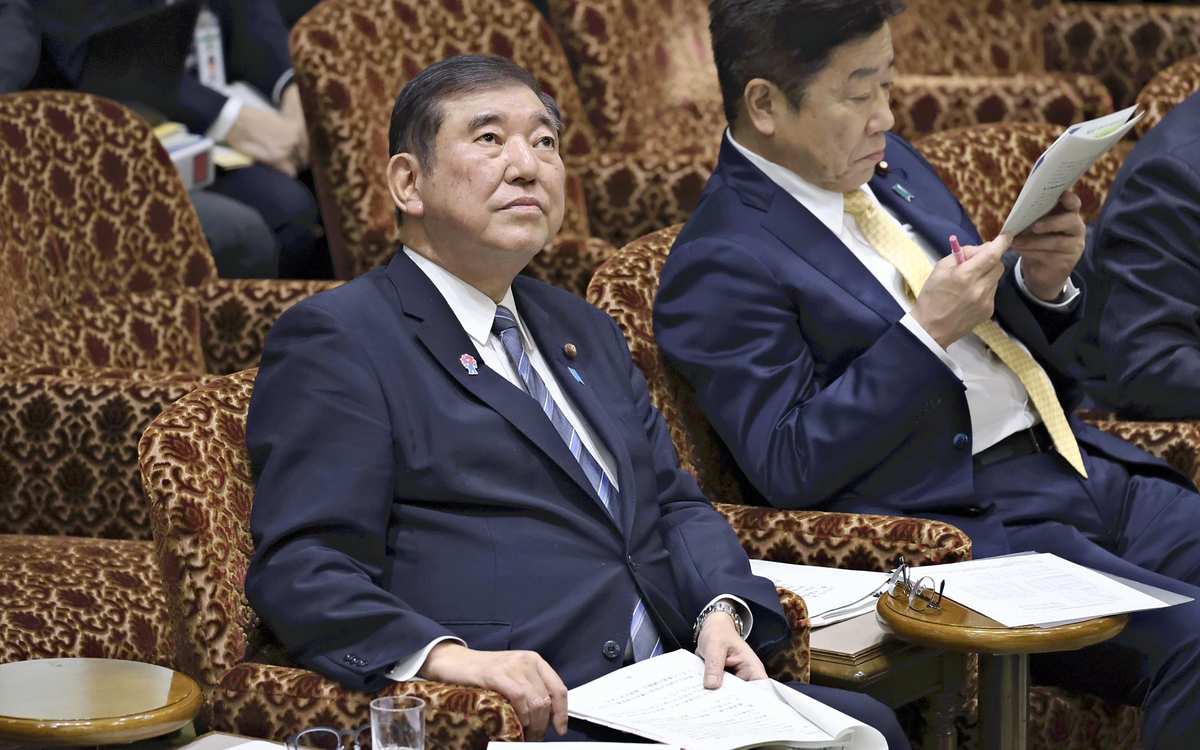Ishiba’s Gift Voucher Scandal a Blow to Budget Talks; PM Admits Causing ‘Unpleasantness’ and ‘Indignation’

Prime Minister Shigeru Ishiba attends a meeting of the House of Councillors Budget Committee on Friday.
21:00 JST, March 15, 2025
Dark clouds are hanging over Prime Minister Shigeru Ishiba’s management of his administration after it came to light that he had distributed gift vouchers to first-time House of Representatives members of his ruling Liberal Democratic Party.
Ishiba has admitted to distributing gift vouchers worth ¥100,000 each to the 15 freshman lower house members. Ahead of a meeting with the lawmakers at the prime minister’s official residence, Ishiba’s secretary reportedly handed out the gift vouchers.
In the face of opposition parties’ demands for Ishiba to step down, the minority coalition government is expected to experience even more difficulties in Diet deliberations. Moves to unseat Ishiba may also intensify within the LDP as this summer’s House of Councillors election approaches.
“It’s all my fault. I’ve been negligent. I am terribly sorry,” Ishiba repeatedly said when ruling and opposition party members grilled him about his distribution of the gift vouchers at the upper house Budget Committee.
While maintaining his stance that the distribution does not fall under the Political Funds Control Law and that there was no violation of the Public Offices Election Law, Ishiba admitted to his responsibility.
“I am aware that politicians need to take responsibility for what they have caused, so I should be rightly responsible for the fact that I have caused unpleasantness for many people and provoked indignation among them,” he said.
He tried to show humility because Diet deliberations on the fiscal 2025 budget bill are in their final phase. The revised budget bill is envisaged to be approved at the upper house on March 28 and sent back to the lower house for expected approval on March 31.
Although the upper house Budget Committee proceeded as scheduled on Friday, the schedule is extremely tight for the bill to be passed within the current fiscal year, which ends on March 31.
An LDP executive expressed a sense of crisis over the situation. “It happened at the worst possible time,” he said.
“[The prime minister] was thoughtless given that the party is under fire over the issue of politics and money,” said Tetsushi Sakamoto, chairperson of the party’s Diet Affairs Committee.
Komeito edging away from PM
The LDP’s ruling coalition partner, Komeito, began subtly distancing itself from Ishiba.
Komeito leader Tetsuo Saito reportedly told the prime minister over the phone on Thursday that it would be difficult to obtain public understanding on the matter and asked him to seriously accept people’s voices.
“When I heard the report, I could hardly believe my ears,” Saito said at a news conference on Friday. “It is significantly out of touch with public sentiment.”
In the opposition parties, however, an increasing number of members maintain that they should not prevent the revised budget bill’s passage by the end of this fiscal year, as it reflects their demand to put off raising the upper limit on patients’ co-payments in the high-cost medical expense benefit system, which is intended to reduce the burden on patients when their medical expenses become too high.
If opposition parties do not cooperate in passing the revised bill at the lower house after its passage at the upper house, it will create a situation in which the decisions of the two houses differ. In case the two houses still cannot reach an agreement at a joint committee of both houses, the Constitution states that the lower house’s choice takes precedence and the budget bill passed at the lower house will be adopted, meaning that the opposition’s demand to put off reforming the high-cost medical expense benefit system will fall to pieces.
Nevertheless, the opposition parties are set to strictly pursue Ishiba’s responsibility.
“[The distribution of gift vouchers] may be in violation of the Public Offices Election Law,” Yoshihiko Noda, president of the Constitutional Democratic Party of Japan, said at a press conference. “No matter how you look at it, it appears to be nothing other than a donation related to political activities.”
Other opposition figures also criticized Ishiba.
“If he cannot dispel suspicions, he cannot stay on as prime minister,” said Yuichiro Tamaki, head of the Democratic Party for the People.
“It was what the prime minister himself has done, so we want him to strictly discipline himself, including making a decision on whether he will or will not step down from the post,” Japan Innovation Party chief Hirofumi Yoshimura told The Yomiuri Shimbun.
Attention will be focused on the possibility of a no-confidence motion against the Ishiba Cabinet. If opposition parties submit the motion and unite to support it, it will be possible for them to pass it by securing a majority in the lower house. In that case, the prime minister will be forced to dissolve the lower house within 10 days, or the Cabinet will have to resign en masse, as stipulated in the Constitution.
This prompted some ruling and opposition party members to speculate that Ishiba may be forced to step down in exchange for passing the budget bill.
Related Tags
Top Articles in Politics
-

Japan PM Takaichi’s Cabinet Resigns en Masse
-

Sanae Takaichi Elected 105th Prime Minister of Japan; Keeps All Cabinet Appointees from Previous Term
-

Japan’s Govt to Submit Road Map for Growth Strategy in March, PM Takaichi to Announce in Upcoming Policy Speech
-

LDP Wins Historic Landslide Victory
-

LDP Wins Landslide Victory, Secures Single-party Majority; Ruling Coalition with JIP Poised to Secure Over 300 seats (UPDATE 1)
JN ACCESS RANKING
-

Japan PM Takaichi’s Cabinet Resigns en Masse
-

Japan Institute to Use Domestic Commercial Optical Lattice Clock to Set Japan Standard Time
-

Israeli Ambassador to Japan Speaks about Japan’s Role in the Reconstruction of Gaza
-

Man Infected with Measles Reportedly Dined at Restaurant in Tokyo Station
-

Man Infected with Measles May Have Come in Contact with Many People in Tokyo, Went to Store, Restaurant Around When Symptoms Emerged


















